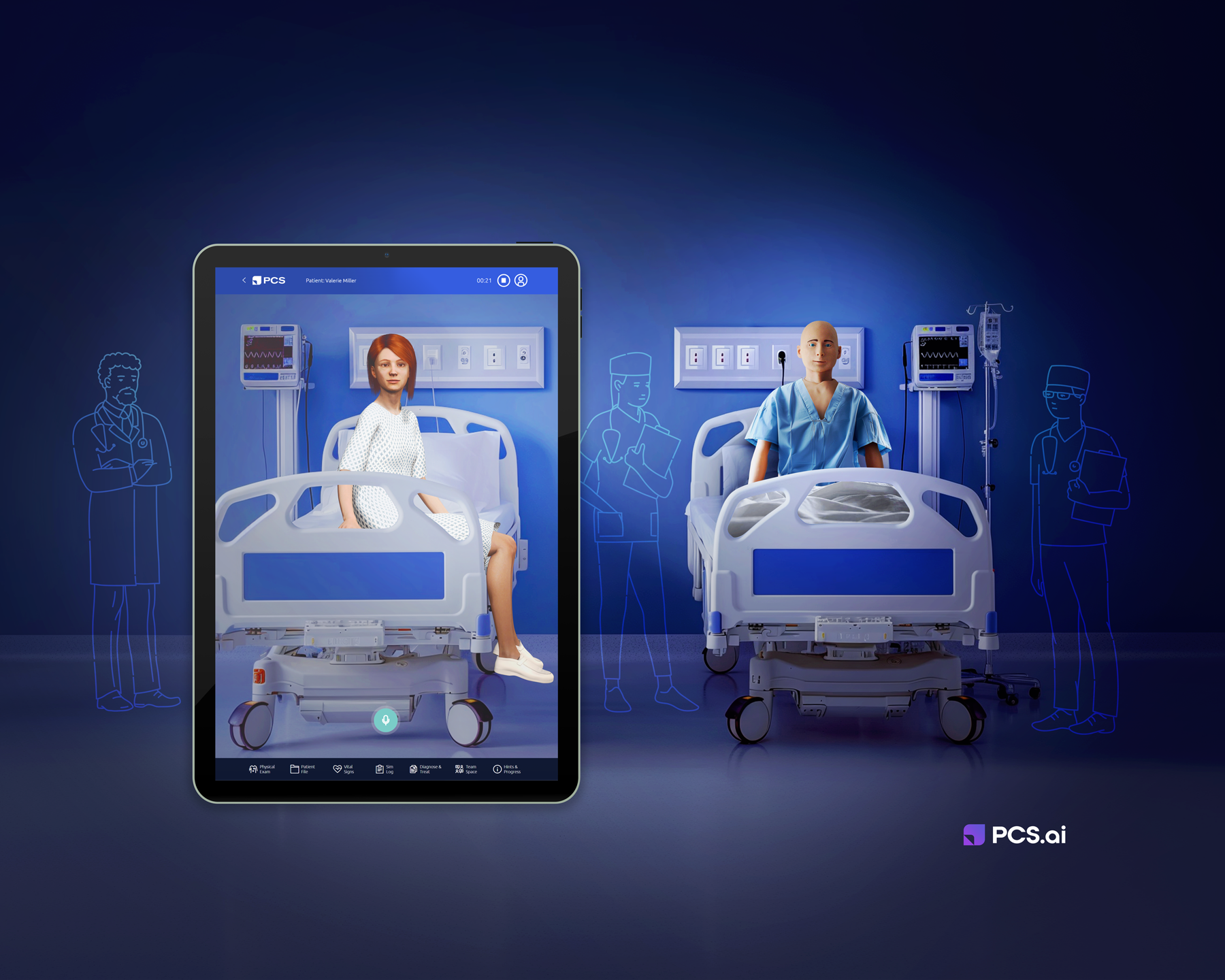
PCS Artificial Intelligence
The AI-First Simulation Platform

In 2017, PCS launched its first AI— a neural network utilizing classification technology, which represented the pinnacle of innovation at the time. While effective enough to achieve widespread adoption, the pre-LLM AI faced notable limitations in scope and capability, particularly in its inability to adapt or improvise.
The emergence of Large Language Models (LLMs) and Generative AI in late 2022 marked a significant advancement in artificial intelligence. At PCS, embracing Generative AI was not an instant success but the outcome of over 18 months of rigorous development and fine-tuning to craft a domain-specific AI tailored to healthcare simulation.
Our model was trained on tens of thousands of examples accumulated over the past 8 years with our pre-LLM AI, enabling it to perform tasks with precision and adhere to the defined context of clinical encounters. This custom training minimizes the need for gap-filling, ensuring highly accurate and context-appropriate responses—an essential advantage of our fine-tuned LLM. Furthermore, while larger models may sometimes deliver satisfactory results, they can be slow in producing verbal outputs. To address this, we focus on optimizing end-to-end latency, ensuring our model operates faster and more efficiently than larger LLMs in this specialized application.

PCS pioneered AI-enabled simulators over 8 years ago, leading the way in healthcare simulation when no other industry competitors were exploring its potential. Today, AI has become a growing focus, and the healthcare simulation industry is no exception.
What sets PCS.AI apart is its foundation as an AI-driven simulation platform, designed to maximize the potential of AI functionality at every possible aspect. Unlike platforms that simply bolt on AI features to existing tools, the PCS simulation platform was built from the ground up with AI at its core.
In 2016, PCS launched its first iteration of AI: a neural network classifier leveraging deep learning and trained through supervised learning. This AI was initially deployed in hundreds of simulators six years ago. At the time, this form of AI was considered cutting-edge and remained so for several years. It was effective enough to gain widespread adoption, generating valuable data that was collected and used to drive a powerful snowball effect in its evolution. Nevertheless, despite its accomplishments, the AI technology had notable limitations. While patient responses were consistent, they lacked true lifelikeness and exhibited clear limitations in scope and capability, particularly in their inability to improvise.
In late 2022, Generative AI gained widespread attention as a transformative technology, reshaping the way we create and interact with digital content. Unlike the traditional AI of yesteryear, which primarily identifies patterns or makes predictions, Generative AI creates entirely new data based on the patterns it has learned. Its ability to mimic human creativity and produce high-quality outputs set a new standard for AI capabilities. Consequently, PCS began transitioning to a Generative AI model in early 2023. Recognizing the effectiveness of custom LLMs, PCS trained these custom models using extensive data from hundreds of thousands of learner interviews on the PCS Spark platform. By 2024, Generative AI integration was fully implemented across all PCS products.


Robust Security: PCS AI is designed to prevent hacks or misuse, keeping simulations reliable and credible.
- More Realistic Simulations: Learners get immersed in lifelike scenarios that feel real, improving engagement and skill retention.
- Personalized Learning Experiences: AI adapts to the needs of each student or professional, offering tailored challenges and feedback.
- Efficient and Scalable Training: With PCS’s generative AI, institutions can train more studen ts without requiring additional faculty time or physical resources.
Generative AI takes things a step further by not just categorizing or responding to inputs, but creating entirely new outputs based on the data it has learned. Imagine a virtual patient who can intelligently answer complex questions, generate realistic scenarios, or adapt dynamically to a learner’s approach. That’s the kind of revolution PCS brings to healthcare education.
By integrating generative AI into every aspect of its platform, PCS is not just keeping up with the times—it’s leading the charge in transforming healthcare education.

AI/Speech includes various AI-enabled functions for speech recognition, intent analysis, latency optimization, response generation, internationalization, and speech synthesis.
AI/Assessment is powered by custom-trained Large Language Models designed to understand, analyze and evaluate the interactions between healthcare learners and manikin simulators.
Is the LLM a custom-trained AI model and tailored for healthcare, ensuring contextually accurate and relevant responses? (Domain-Specific Training)
Can the AI/LLM standardized learner experiences guarantee equitable opportunities and fair assessments? (Consistency)
Can the AI/LLM support multiple simulations simultaneously so programs can train more learners efficiently? (Scalability) Can the AI/LLM response time achieve the speed of natural human interactions? (Latency Optimization)
How does the AI/LLM handle hacks or misuse, keeping simulations reliable and credible? (Robust Security)
However, the PCS Generative AIs are increasingly designed with safeguards to minimize this risk. Safeguards such as: Reinforced Prompt Adherence (trained to follow strict guidelines, ensuring they stick to the intended instructional framework, regardless of the user’s prompts), and Context Retention (programmed to maintain contextual integrity, meaning they won’t disregard prior instructions even if prompted to do so.)
While no system is entirely immune to manipulation, these strategies make PCS AI increasingly robust against attempts to “hack” or exploit its responses.
GenAI DOES operate based on patterns it learned from vast amounts of text data during its training, and it generates responses based on the input it receives. It does have the ability to convincingly act like it’s sentient being!
Ongoing Refinement: PCS constantly fine-tunes models based on user feedback, emphasizing inclusivity and fairness. Our AIs are regularly updated to reduce any unintended biases.
Transparency and Accountability: PCS openly shares limitations, biases, and decision-making processes to encourage informed use of AI tools.
PCS aims to replicate human interaction. In natural face-to-face conversations, response latency is typically around 200–250 milliseconds, just a fraction of a second.
